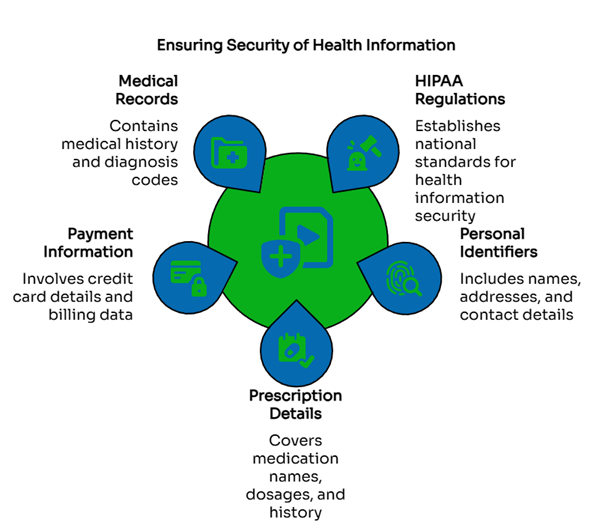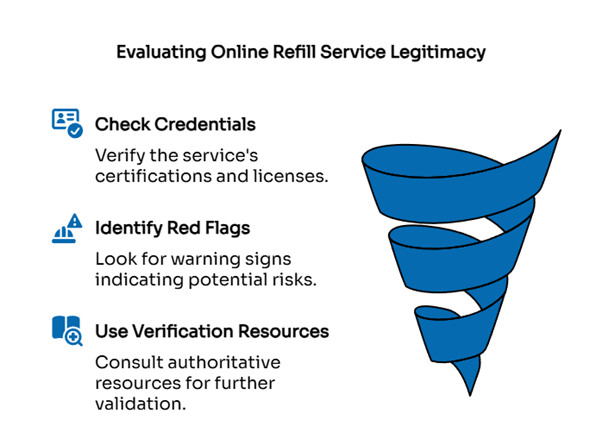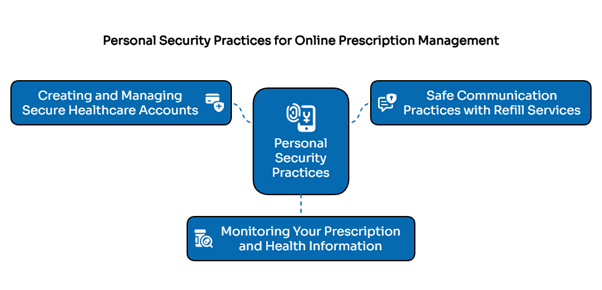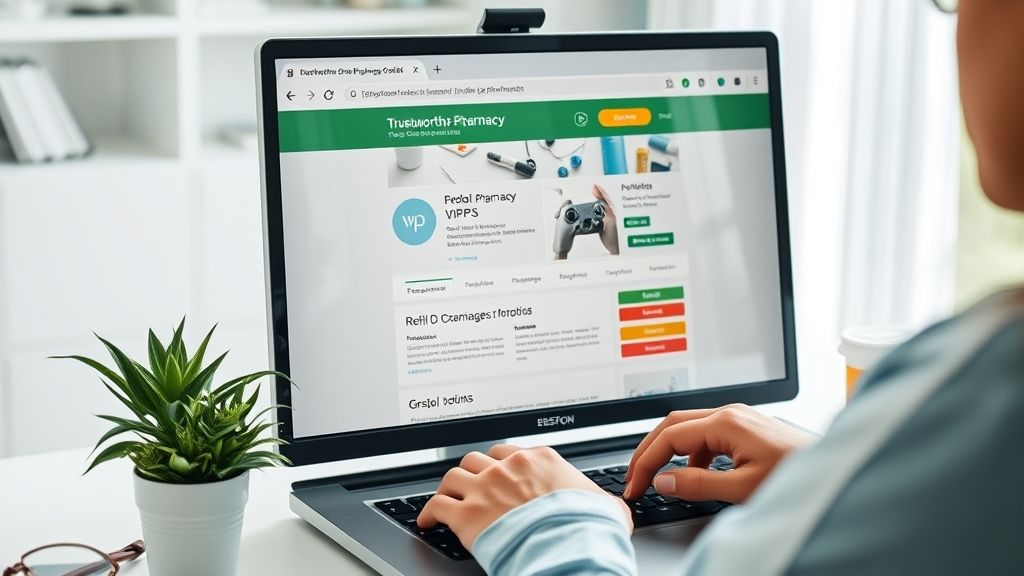Key Takeaways:
- Comprehensive Regulation: HIPAA establishes national standards specifically designed to protect your sensitive health information during online prescription refill transactions, covering everything from your name and address to medication details and diagnosis codes.
- Verification Matters: Look for critical credentials like VIPPS certification, state pharmacy licenses, and participation in the FDA’s BeSafeRx program to ensure you’re using legitimate online refill services that prioritize security.
- Multiple Security Layers: Legitimate services implement several technical safeguards including TLS/SSL encryption for website connections, multi-factor authentication to verify your identity, and specialized systems that protect payment information.
- Personal Security Steps: Take control of your own protection by creating unique passwords for healthcare accounts, enabling multi-factor authentication, using only secure networks, and regularly monitoring your medication history and account activity.
Understanding these security measures allows you to confidently manage prescriptions online while keeping your personal health information protected. The convenience of digital healthcare doesn’t have to come at the expense of your privacy.
The convenience of refilling prescriptions online has transformed healthcare management for millions of Americans. But alongside this convenience comes a natural concern: “Is my personal health information really secure?” Many people hesitate to use digital refill services despite their benefits, worried about privacy risks and data protection.
This guide will walk you through the essential security aspects of online prescription refills, helping you understand how your information is protected, how to verify legitimate services, and practical steps to enhance your personal security when managing medications digitally.
Understanding Health Information Security in the Digital Age

When you submit a refill request online, your health information doesn’t simply float through the internet unprotected. It travels through multiple secured channels governed by strict regulations.
Health information security in digital refill services operates under specific federal protections. The Health Insurance Portability and Accountability Act (HIPAA) stands as the cornerstone of these protections, establishing national standards to safeguard sensitive patient health information.
These regulations require healthcare providers and their business associates to implement specific safeguards for protecting electronic health information.
Protected Health Information (PHI)
HIPAA specifically protects what’s known as Protected Health Information (PHI) during online prescription refill transactions. This includes personal identifiers such as:
- Your full name and date of birth
- Home address, email address, and phone numbers
- Insurance member ID and group numbers
- Prescription details, including medication names, dosages, and quantities
- Prescription numbers and refill history
- Payment information
- Medical record numbers
- Diagnosis codes and health conditions
- Prescribing physician information
- Dates of treatments or prescriptions
These pieces of information, whether alone or combined, could identify you and must be secured during all prescription refill transactions.
Common Misconceptions
Many consumers have misconceptions about online refill security that cause unnecessary anxiety:
- Misconception: Online refill services are inherently less secure than traditional methods
- Reality: Well-implemented digital healthcare platforms can offer robust security measures, though their effectiveness compared to paper systems depends heavily on implementation quality. Properly managed paper systems have their own security protocols, while poorly secured digital systems may create significant vulnerabilities.
- Misconception: Anyone with technical skills can easily access your prescription information
- Reality: Multiple layers of security protocols protect digital health information, though it’s important to recognize that sophisticated attacks and system vulnerabilities can still potentially lead to data breaches despite these protections.
- Misconception: Digital refill services regularly share or sell your health information
- Reality: HIPAA strictly regulates how health information can be used and shared
💡 Quick Takeaways
- Federal protection: HIPAA regulations establish national standards for safeguarding your digital health information during refill transactions
- Protected data types: Specific personal identifiers like your name, address, medication details, and diagnosis codes receive special protection as PHI
- Digital security effectiveness: The security of online refill services depends on implementation quality—well-designed systems can offer strong protection, while poorly implemented ones may create risks
Identifying Legitimate and Secure Online Refill Services

Not all digital refill services offer equal security measures. Knowing how to identify legitimate services helps ensure your personal health information remains protected.
Verification Credentials to Look For
When evaluating an online refill service, check for these important credentials:
- VIPPS (Verified Internet Pharmacy Practice Sites) certification from the National Association of Boards of Pharmacy
- BeSafeRx program participation through the FDA
- State board of pharmacy licenses and accreditations
- U.S.-based operations with verifiable physical addresses and phone numbers
- Requirement for valid prescriptions before processing refills
Red Flags That Signal Security Risks
Watch for these warning signs that might indicate security vulnerabilities:
- No requirement for prescription verification
- Absence of pharmacist consultation options
- Missing or vague privacy policies
- Unsecured websites (lacking https or the lock icon in browser)
- No clear company information or physical address
- Unusually low prices that seem too good to be true
Resources for Verifying Legitimacy
Several authoritative resources can help verify the security credentials of digital refill services:
- The National Association of Boards of Pharmacy (NABP) website
- FDA’s BeSafeRx program resources
- Your state’s board of pharmacy website
- Your health insurance provider’s list of approved digital service partners
💡 Quick Takeaways
- Verification matters: Look for specific credentials like VIPPS certification and state pharmacy licenses before using digital refill services
- Security signals: Learn to recognize red flags that may indicate security risks in online refill platforms
- Trust verification: Use authoritative resources like NABP and FDA programs to confirm service legitimacy
Security Features That Protect Your Health Information
Understanding the security features that protect your data can provide peace of mind when refilling prescriptions online. The technology behind Rx refill online services is designed with multiple safeguards to protect your sensitive information.
Encryption Standards for Medical Information
Legitimate digital refill services implement robust encryption methods to protect your health information during transmission and storage:
- TLS/SSL encryption (indicated by https and the lock icon) to secure data transmission between your browser and the service’s website
- End-to-end encryption, typically found within the platform’s secure messaging features, which prevents third parties from accessing communications about your prescriptions
- Database encryption that protects stored health information
- Encrypted backups to maintain security in secondary storage
Authentication Processes
Strong authentication methods verify your identity before granting access to your prescription information:
- Multi-factor authentication (MFA) combines something you know, like a password, with something you have, like your phone
- Biometric authentication options (fingerprints, facial recognition)
- Knowledge-based verification questions
- Secure password requirements and regular password reset policies
Secure Payment Processing Systems
Legitimate refill services protect your financial information through:
- PCI DSS compliance for handling credit card information
- Tokenization technology that replaces sensitive payment data with non-sensitive equivalents
- Separation of payment information from health information
- Limited data retention policies for payment details
💡 Quick Takeaways
- Encryption protection: Different types of encryption safeguard your health information depending on the activity—TLS/SSL for website connections and potentially end-to-end encryption for platform messaging
- Identity verification: Strong multi-factor authentication methods ensure only authorized individuals access your prescription information
- Financial security: Specialized systems protect payment information during refill transactions
Personal Security Practices for Online Prescription Management

Taking proactive steps to enhance your personal security provides an additional layer of protection when using digital refill services.
Creating and Managing Secure Healthcare Accounts
- Use unique, complex passwords for healthcare accounts
- Enable multi-factor authentication whenever available
- Access accounts only on secure, private networks—avoid public WiFi for healthcare transactions
- Log out completely after each session
- Regularly update passwords and security questions
Safe Communication Practices with Refill Services
- Use secure messaging systems provided within the platform
- Verify email communications come from legitimate sources before clicking links
- Never share prescription or insurance information through unsecured channels like regular email
- Be cautious about the information you share in refill notes or messages
- Report suspicious communications immediately to the service provider
Monitoring Your Prescription and Health Information
- Regularly review your medication history in your online accounts
- Check explanation of benefits from your insurance provider
- Review credit card and bank statements for unauthorized charges
- Consider setting up alerts for account activities
- Periodically request records of who has accessed your health information (which is your right under HIPAA)
💡 Quick Takeaways
- Account protection: Create strong passwords, enable multi-factor authentication, and always log out completely from healthcare accounts
- Communication safety: Only share sensitive information through secure channels provided by legitimate refill services
- Regular monitoring: Develop habits to review your medication history and track who accesses your prescription information
Conclusion
Managing your prescriptions online offers valuable convenience, but taking time to understand and implement proper security measures ensures this convenience doesn’t come at the cost of your privacy. By verifying the legitimacy of refill services, understanding the security features that protect your information, and implementing personal security practices, you can confidently manage your medications digitally.
The digital healthcare landscape continues to evolve, offering increasingly user-friendly options for medication management. With proper security awareness, you can embrace these convenient solutions while keeping your personal health information protected.
The time you invest in security awareness today pays dividends in both convenience and peace of mind tomorrow.
Frequently Asked Questions
Q: How can I verify if an online refill service is legitimate before sharing my prescription information?
A: Look for VIPPS (Verified Internet Pharmacy Practice Sites) certification from the National Association of Boards of Pharmacy, verify the service requires a valid prescription, check that they have a licensed pharmacist available for consultation, and confirm they’re located in the United States. Legitimate services will always have a physical address, phone number, and require proper medical documentation before dispensing medications.
Q: What security features should I look for when choosing an online service for prescription refills?
A: Prioritize services that use https secure connections (look for the lock icon in your browser), offer multi-factor authentication for account access, have clear privacy policies explaining how they protect your data, use encrypted connections for all transactions, and provide secure messaging systems for communicating about your medications. Services connected to established healthcare systems often implement additional security protocols.
Frequently Unasked Questions
Q: How might sharing my prescription information across multiple online refill services increase my security risks?
A: Using multiple online services can create a fragmented medication profile across various platforms, potentially increasing vulnerability points for your health information. Each new service relationship requires sharing your personal and medical data, multiplying exposure risk. Consider that each platform has different security standards, privacy policies, and data retention practices. Additionally, tracking potential security breaches becomes more challenging when your information is spread across multiple services, potentially delaying your awareness of compromised data.
Q: What rights do I have if my prescription or health insurance information is compromised through an online refill service?
A: Beyond general data breach protections, you have specific rights under HIPAA when health information is compromised. You’re entitled to be notified of any breach affecting your protected health information, typically within 60 days of discovery. You can request an accounting of disclosures to track who accessed your information. You maintain the right to file complaints with both the service and the HHS Office for Civil Rights. In many cases, you may be entitled to complementary credit monitoring and identity protection services, and in situations of demonstrable harm, you may have grounds for legal action.
Ready for a Safer, Simpler Way to Refill Your Prescription?
With Refill Genie, you can enjoy the convenience of online prescription refills—without compromising your privacy. Our platform is designed with robust security features and strict adherence to HIPAA standards, so you can manage medications like Zoloft, Metformin, Synthroid, and more with confidence.
Whether you’re at home or on the go, Refill Genie empowers you to securely request refills for the medications you rely on—fast, easy, and stress-free.
🔒 Experience convenience with built-in protection
💊 Get fast access to essential medications
✅ Trust a HIPAA-compliant, U.S.-based service with real-time support
Don’t wait—your next refill is just a few clicks away.
👉 Refill Now with Refill Genie and take control of your healthcare with confidence.

